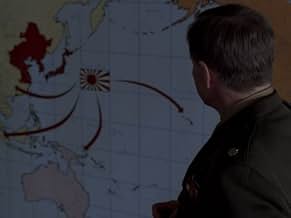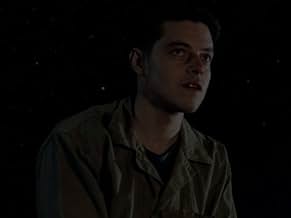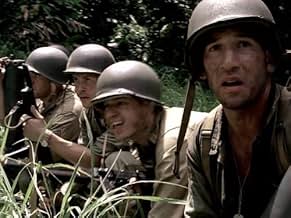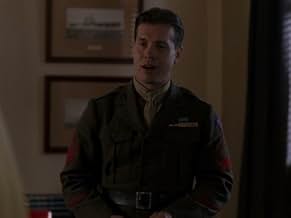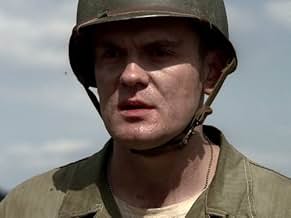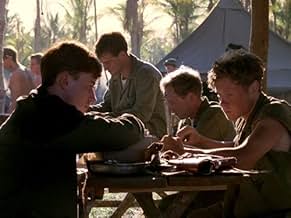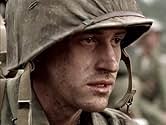The Pacific Theatre of World War II, as seen through the eyes of several young Marines.The Pacific Theatre of World War II, as seen through the eyes of several young Marines.The Pacific Theatre of World War II, as seen through the eyes of several young Marines.
- Won 8 Primetime Emmys
- 36 wins & 44 nominations total
Browse episodes
Featured reviews
I'm Australian and it's ANZAC day today where the whole country honours all those who have served our country and others in all theatres of war. I judge The Pacific as a dramatic representation of the war in the Pacific, not a 100% historically accurate documentary.
I'm so glad The Pacific is on, because it highlights part of the war that was so vital to my country. I might not be Australian today if our allied forces hadn't won the battles. Maybe because I grew up with a significant focus on the impacts of the war with the Japanese, I get a lot from the show and when I watch it I feel how awful it was for the marines and all who were there, and how Australia was the closest safe haven for those men and women. Just seeing a brief mention of the starvation, tropical ulcers, how important it was to stop the Japanese airstrip on Guadalcanal, the Japanese mentality, is enough for me to get a lot out of the show. I already know how long it went on for, and that the battles were many and varied.
Think the Burma railway, Changi, Kokoda, and I realise the enormity of what these people went through, they were skeletons in rags if they manged to survive and come out of there. The Japanese bombed Darwin, there were submarines in Sydney Harbour, and just last year, we finally discovered the wreck of a hospital ship that he Japanese torpedoed and sank, just off Brisbane. The college I attended was turned into a US army hospital base in WWII and has miles of underground tunnels. MacArthur's base in Brisbane is still named after him, it's now a shopping centre, MacArthur Central. The anniversary of the battle of the Coral Sea a few years ago in Townsville was huge.
The Pacific is a great show for me. I like it, I appreciate what they're representing in the short time they have to do it in a TV show. Just a quick look at someone who says goodbye to family in a snowy climate and then lands on a tropical island speaks volumes about what they faced to me. If it brings even a small amount of appreciation to others who are not as familiar with this part of WWII, The Pacific has done a great job. I give it a thumbs up.
For another interesting story set around this time, check out the movie Paradise Road.
I'm so glad The Pacific is on, because it highlights part of the war that was so vital to my country. I might not be Australian today if our allied forces hadn't won the battles. Maybe because I grew up with a significant focus on the impacts of the war with the Japanese, I get a lot from the show and when I watch it I feel how awful it was for the marines and all who were there, and how Australia was the closest safe haven for those men and women. Just seeing a brief mention of the starvation, tropical ulcers, how important it was to stop the Japanese airstrip on Guadalcanal, the Japanese mentality, is enough for me to get a lot out of the show. I already know how long it went on for, and that the battles were many and varied.
Think the Burma railway, Changi, Kokoda, and I realise the enormity of what these people went through, they were skeletons in rags if they manged to survive and come out of there. The Japanese bombed Darwin, there were submarines in Sydney Harbour, and just last year, we finally discovered the wreck of a hospital ship that he Japanese torpedoed and sank, just off Brisbane. The college I attended was turned into a US army hospital base in WWII and has miles of underground tunnels. MacArthur's base in Brisbane is still named after him, it's now a shopping centre, MacArthur Central. The anniversary of the battle of the Coral Sea a few years ago in Townsville was huge.
The Pacific is a great show for me. I like it, I appreciate what they're representing in the short time they have to do it in a TV show. Just a quick look at someone who says goodbye to family in a snowy climate and then lands on a tropical island speaks volumes about what they faced to me. If it brings even a small amount of appreciation to others who are not as familiar with this part of WWII, The Pacific has done a great job. I give it a thumbs up.
For another interesting story set around this time, check out the movie Paradise Road.
If you want to see the Pacific version of HBO's critically acclaimed "Band of Brothers", change the channel
"The Pacific" differs from "Band of Brothers" whereas the "The Pacific" focuses on the war itself and "Band of Brothers" focused on the characters. Both miniseries are championed by Hollywood heavy-hitters Tom Hanks and Steven Spielberg who were contributing writers and producers of both miniseries.
Perhaps the greatest distinction between the two mini-series was intentional. It is clear that the soldiers in the Pacific theater fought a different kind of war than those fighting in Europe. "The Pacific" is a gritty if not gory depiction of a war against not just the Japanese, but also the elements. The cast is made-up of some brilliant actors we are sure to see again in future projects. What makes "The Pacific" so good is the intense realism which brings the viewer into the battle from the safety of your couch. If there is hell on earth, you will find it here.
The army they are fighting is alien; both mysterious and ferocious. They are looked at with both awe and disdain and the Americans want to kill them all. However, there is a palpable sense fear among the men that this enemy will never surrender and will fight beyond what they feel is humanly if not morally possible. When one character hears about the Kamikaze's flying their planes into ships, he asks aloud "how can any man do that?" "The Pacific" is fast-paced and each episode leaves the viewer wanting more.
What lacks in the series is the intimacy of knowing the characters. They are kept at a distance almost as if the character doesn't want to let you in. This may be the intent of the writers; just as the soldiers took little interest in knowing each other, maybe we are not meant to know the characters.
"The Pacific" differs from "Band of Brothers" whereas the "The Pacific" focuses on the war itself and "Band of Brothers" focused on the characters. Both miniseries are championed by Hollywood heavy-hitters Tom Hanks and Steven Spielberg who were contributing writers and producers of both miniseries.
Perhaps the greatest distinction between the two mini-series was intentional. It is clear that the soldiers in the Pacific theater fought a different kind of war than those fighting in Europe. "The Pacific" is a gritty if not gory depiction of a war against not just the Japanese, but also the elements. The cast is made-up of some brilliant actors we are sure to see again in future projects. What makes "The Pacific" so good is the intense realism which brings the viewer into the battle from the safety of your couch. If there is hell on earth, you will find it here.
The army they are fighting is alien; both mysterious and ferocious. They are looked at with both awe and disdain and the Americans want to kill them all. However, there is a palpable sense fear among the men that this enemy will never surrender and will fight beyond what they feel is humanly if not morally possible. When one character hears about the Kamikaze's flying their planes into ships, he asks aloud "how can any man do that?" "The Pacific" is fast-paced and each episode leaves the viewer wanting more.
What lacks in the series is the intimacy of knowing the characters. They are kept at a distance almost as if the character doesn't want to let you in. This may be the intent of the writers; just as the soldiers took little interest in knowing each other, maybe we are not meant to know the characters.
Please, for the love of God, please do not overlook this miniseries. I have seen way too many people who don't bother to see The Pacific because it wasn't like Band of Brothers. This was in no way, shape, or form meant to be like BoB. If you have studied WW2 at all, you would know that the war in the Pacific was a totally different war than the European theater.
I loved Band of Brothers, it was a great and realistic series of the harsh realities of warfare and the scars it can leave. The Pacific was much harder to watch than BoB ever was. BoB was all about the bonds formed in combat and how this can tear people apart. This grim series displayed how completely unprepared the US military was mentally for how truly horrific this war would be. Not only were you fighting the unpredictable and relentless Japanese soldiers, but you were also fighting the terrain. The dense woods, the heavy rain, the thick mud. Not to mention all the diseases that came with these harsh conditions. Water was a luxury in a lot of situations. The filmmakers brilliantly showed how this affected the fighting men, who became virtually hollow shells, their sanity teetering on the edge of their knives.
The Japanese killed everyone without remorse. One particular scene that gave me chills to witness was in the latter half of the series when a group of civilians was slaughtered by a Japanese machine gun nest while running to the American forces. One person, a child, started to crawl slowly to the lines, a couple bullet wounds on his body. One of the combat rookies wanted to run in to help the poor boy, but was kept back so they would not be shoot too. All the Marines could do was watch, as the helpless child was brutally killed after a bullet from that machine gun emplacement hit him in the back of the head and his body went limp instantaneously.
This is on par with Saving Private Ryan, another collaboration between Tom Hanks and Steven Spielberg, as one of the most horrific, gruesome, and realistic war dramas ever put to film. I highly recommend giving it a watch, but be warned: this series is not for the faint of heart.
I loved Band of Brothers, it was a great and realistic series of the harsh realities of warfare and the scars it can leave. The Pacific was much harder to watch than BoB ever was. BoB was all about the bonds formed in combat and how this can tear people apart. This grim series displayed how completely unprepared the US military was mentally for how truly horrific this war would be. Not only were you fighting the unpredictable and relentless Japanese soldiers, but you were also fighting the terrain. The dense woods, the heavy rain, the thick mud. Not to mention all the diseases that came with these harsh conditions. Water was a luxury in a lot of situations. The filmmakers brilliantly showed how this affected the fighting men, who became virtually hollow shells, their sanity teetering on the edge of their knives.
The Japanese killed everyone without remorse. One particular scene that gave me chills to witness was in the latter half of the series when a group of civilians was slaughtered by a Japanese machine gun nest while running to the American forces. One person, a child, started to crawl slowly to the lines, a couple bullet wounds on his body. One of the combat rookies wanted to run in to help the poor boy, but was kept back so they would not be shoot too. All the Marines could do was watch, as the helpless child was brutally killed after a bullet from that machine gun emplacement hit him in the back of the head and his body went limp instantaneously.
This is on par with Saving Private Ryan, another collaboration between Tom Hanks and Steven Spielberg, as one of the most horrific, gruesome, and realistic war dramas ever put to film. I highly recommend giving it a watch, but be warned: this series is not for the faint of heart.
I couldn't tell you how many times I have watched Band of Brothers. I think it is the best production ever made. However, I resisted watching The Pacific. My father had five years active duty in the Marine Corps when I was born, and remained on active duty until I was 30 years old. I was ten when he left for Viet Nam, the first time, and in high school the next. I had friends whose fathers were seriously wounded, or killed, there. I have always felt like Marines are family, and any depiction of them being killed has always been hard to see. However, I finally decided to "man-up" and watch it, on Veteran's Day this year.
I think BoB was a dream come true for the producers. They had ironclad characters to follow all the way through, and many of the men were still alive and took part in it. The story of Easy company had been put into book form, brilliantly. They didn't have that with The Pacific. The closest they could come was to base it all around three separate men; Robert Leckie,Eugene Sledge and John Basilone. The three men's paths crossed, some,but they did not belong to the same units or know each other, although Leckie and Sledge both knew Basilone's reputation.
As brutal and difficult as the war in Europe was, the Pacific war against the Japanese was almost incomprehensible. Except for their time in Australia, following Guadalcanal, they were fighting the most brutal fights in history, while in the most punishing places on earth.It is a wonder that any of them were ever able to return to civilization and dull the memories of those horrors enough to lead a more or less normal life.
Because of the brutality of both the enemy and the conditions they had to live and fight under, there isn't much in the way of light-heartedness. The Pacific is not as enjoyable as BoB. Anyone seeing it for the first time should not expect to be entertained. It is a bit more difficult to get into. I found it helpful to watch the first episode twice before going on. A little patience in getting to know the primary characters payed off. I also think being able to watch it all over the course of a few days, like I did, was much better than watching it as it was first presented, one episode each week for ten weeks.
There were some excellent performances in The Pacific. Someone else singled out Ravi Malek's portrayal of Merriel "Snafu" Sheldon as award worthy and I agree 100%! I loved William Sadler as LtCol. Lewis "Chesty" Puller, and I was also very impressed with Tom Budge as PFC Ronnie Gibson.
The three primary characters are portrayed worthily. I didn't think Joe Mazzello as Sledge developed his character as well as the other two. However, I ended up with only nine episodes on my DVR. The one I am missing is episode five, which I suspect is centered on Sledge, so perhaps the character will seem better developed to me after I see it. Jon Seda gave a fine performance as John Basilone, which was definitely the roll of a lifetime! I think my favorite of the three was James Badge Dale, as Bob Leckie.
I wasn't as depressed by seeing a portrayal of so many Marines being killed and wounded as I expected. That was partly because not many of them really looked like Marines to me. I have always said that you can put an actor in the Marine Corps uniform but you usually can't make him look like a Marine. There were a few, though, who were totally believable including Jon Seda. Others have commented on the length of the men's hair as being distracting and/or inaccurate. By my first memories, in the mid-late 50s, Marines were wearing the crew-cuts and flat-tops that they have worn ever since. However, I have pictures of my dad in uniform, from a decade earlier, with longer hair, so I think the producers knew what they were doing there.
Although I agree with most posters here, that The Pacific is not as good as BoB, it is still well-done and definitely worth seeing. I think watching it with an open mind, and avoiding comparisons, it is a good way to approach it.
One last comment I have is that I wonder why one young Marine, who was killed on Iwo Jima at age 17, was singled out in the tributes at the end. I assume they meant that to symbolize the thousands of young men who were killed, and it was very effective, IMO. But I would be interested to know why they chose the one they did; if perhaps someone involved in the production was a relative of the young man. I won't say his name for those who might not have seen it yet, but I will always remember it.
I think BoB was a dream come true for the producers. They had ironclad characters to follow all the way through, and many of the men were still alive and took part in it. The story of Easy company had been put into book form, brilliantly. They didn't have that with The Pacific. The closest they could come was to base it all around three separate men; Robert Leckie,Eugene Sledge and John Basilone. The three men's paths crossed, some,but they did not belong to the same units or know each other, although Leckie and Sledge both knew Basilone's reputation.
As brutal and difficult as the war in Europe was, the Pacific war against the Japanese was almost incomprehensible. Except for their time in Australia, following Guadalcanal, they were fighting the most brutal fights in history, while in the most punishing places on earth.It is a wonder that any of them were ever able to return to civilization and dull the memories of those horrors enough to lead a more or less normal life.
Because of the brutality of both the enemy and the conditions they had to live and fight under, there isn't much in the way of light-heartedness. The Pacific is not as enjoyable as BoB. Anyone seeing it for the first time should not expect to be entertained. It is a bit more difficult to get into. I found it helpful to watch the first episode twice before going on. A little patience in getting to know the primary characters payed off. I also think being able to watch it all over the course of a few days, like I did, was much better than watching it as it was first presented, one episode each week for ten weeks.
There were some excellent performances in The Pacific. Someone else singled out Ravi Malek's portrayal of Merriel "Snafu" Sheldon as award worthy and I agree 100%! I loved William Sadler as LtCol. Lewis "Chesty" Puller, and I was also very impressed with Tom Budge as PFC Ronnie Gibson.
The three primary characters are portrayed worthily. I didn't think Joe Mazzello as Sledge developed his character as well as the other two. However, I ended up with only nine episodes on my DVR. The one I am missing is episode five, which I suspect is centered on Sledge, so perhaps the character will seem better developed to me after I see it. Jon Seda gave a fine performance as John Basilone, which was definitely the roll of a lifetime! I think my favorite of the three was James Badge Dale, as Bob Leckie.
I wasn't as depressed by seeing a portrayal of so many Marines being killed and wounded as I expected. That was partly because not many of them really looked like Marines to me. I have always said that you can put an actor in the Marine Corps uniform but you usually can't make him look like a Marine. There were a few, though, who were totally believable including Jon Seda. Others have commented on the length of the men's hair as being distracting and/or inaccurate. By my first memories, in the mid-late 50s, Marines were wearing the crew-cuts and flat-tops that they have worn ever since. However, I have pictures of my dad in uniform, from a decade earlier, with longer hair, so I think the producers knew what they were doing there.
Although I agree with most posters here, that The Pacific is not as good as BoB, it is still well-done and definitely worth seeing. I think watching it with an open mind, and avoiding comparisons, it is a good way to approach it.
One last comment I have is that I wonder why one young Marine, who was killed on Iwo Jima at age 17, was singled out in the tributes at the end. I assume they meant that to symbolize the thousands of young men who were killed, and it was very effective, IMO. But I would be interested to know why they chose the one they did; if perhaps someone involved in the production was a relative of the young man. I won't say his name for those who might not have seen it yet, but I will always remember it.
The Pacific... every time I come across this series I always want to watch it again. The show really shows you what the soldiers that fought in WW2 felt and went through. It's series like this that keep the memory of those brave soldiers who fought for their country alive. And also, the opening theme is... Just hear it for yourself.
Did you know
- TriviaDuring his audition, Rami Malek (Snafu) noticed that the man running the camera was not, as is typical, a young assistant, but an older gentleman who was doing some "very elegant camera work." Midway through his scene, he realized that the camera operator was actually Steven Spielberg.
- GoofsAt about 1:20 into the opening credits, a Navy ship sails into view from the left. On the bow is a small vertical mast (the jackstaff) flying a small flag (the Jack). The Jack and jackstaff are only used when the ship is anchored or moored never when it is underway.
- ConnectionsFeatured in The 62nd Primetime Emmy Awards (2010)
- How many seasons does The Pacific have?Powered by Alexa
Details
- Release date
- Countries of origin
- Official site
- Languages
- Also known as
- The Pacific
- Filming locations
- Production companies
- See more company credits at IMDbPro
- Runtime
- 1h(60 min)
- Color
- Sound mix
- Aspect ratio
- 1.78 : 1
Contribute to this page
Suggest an edit or add missing content





